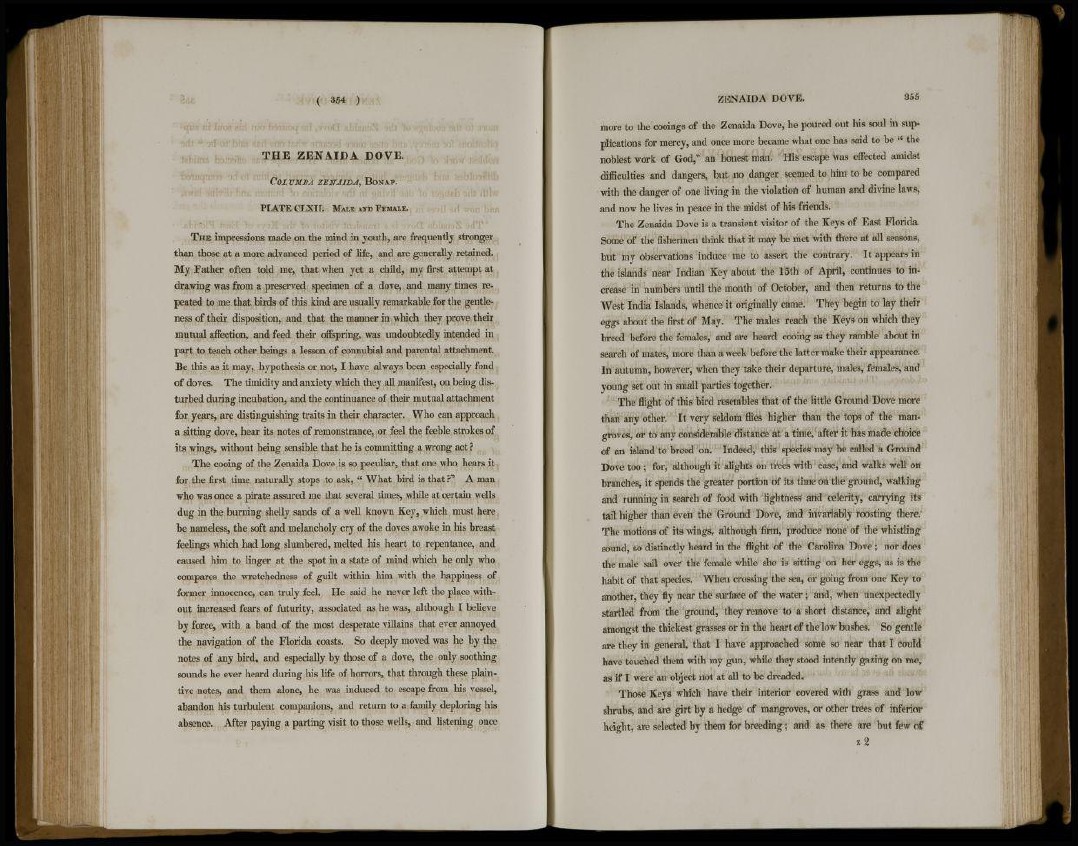
T H E ZENAIDA DOVE.
COLUMBA ZENAIDA, BoNAP.
P L A T E C L X I I . MALE AND FEMALE.
T H E impressions made on the mind in youth, are frequently stronger
than those at a more advanced period of life, and are generally retained.
My Father often told me, that when yet a child, my first attempt at
drawing was from a preserved specimen of a dove, and many times repeated
to me that birds of this kind are usually remarkable for the gentleness
of their disposition, and that the manner in which they prove their
mutual affection, and feed their offspring, was undoubtedly intended in
part to teach other beings a lesson of connubial and parental attachment.
Be this as it may, hypothesis or not, I have always been especially fond
of doves. The timidity and anxiety which they all manifest, on being disturbed
during incubation, and the continuance of their mutual attachment
for years, are distinguishing traits in their character. Who can approach
a sitting dove, hear its notes of remonstrance, or feel the feeble strokes of
its wings, without being sensible that he is committing a wrong act ?
The cooing of the Zenaida Dove is so peculiar, that one who hears it
for the first time naturally stops to ask, " What bird is that ?* A man
who was once a pirate assured me that several times, while at certain wells
dug in the burning shelly sands of a well known Key, which must here
be nameless, the soft and melancholy cry of the doves awoke in his breast
feelings which had long slumbered, melted his heart to repentance, and
caused him to finger at the spot in a state of mind which he only who
compares the wretchedness of guilt within him with the happiness of
former innocence, can truly feel. He said he never left the place without
increased fears of futurity, associated as he was, although I believe
by force, with a band of the most desperate villains that ever annoyed
the navigation of the Florida coasts. So deeply moved was he by the
notes of any bird, and especially by those of a dove, the only soothing
sounds he ever heard during his fife of horrors, that through these plaintive
notes, and them alone, he was induced to escape from his vessel,
abandon his turbulent companions, and return to a family deploring his
absence. After paying a parting visit to those wells, and listening once
more to the cooings of the Zenaida Dove, he poured out his soul in supplications
for mercy, and once more became what one has said to be " the
noblest work of God," an honest man. His escape was effected amidst
difficulties and dangers, but no danger seemed to him to be compared
with the danger of one living in the violation of human and divine laws,
and now he lives in peace in the midst of his friends.
The Zenaida Dove is a transient visitor of the Keys of East Florida.
Some of the fishermen think that it may be met with there at all seasons,
but my observations induce me to assert the contrary. It appears in
the islands near Indian Key about the 15th of April, continues to increase
in numbers until the month of October, and then returns to the
West India Islands, whence it originally came. They begin to lay their
eggs about the first of May. The males reach the Keys on which they
breed before the females, and are heard cooing as they ramble about in
search of mates, more than a week before the latter make their appearance.
In autumn, however, when they take their departure, males, females, and
young set out in small parties together.
The flight of this bird resembles that of the little Ground Dove more
than any other. It very seldom flies higher than the tops of the mangroves,
or to any considerable distance at a time, after it has made choice
of an island to breed on. Indeed, this species may be called a Ground
Dove too; for, although it alights on trees with ease, and walks well on
branches, it spends the greater portion of its time on the ground, walking
and running in search of food with lightness and celerity, carrying its
tail higher than even the Ground Dove, and invariably roosting there:
The motions of its wings, although firm, produce none of the whistling
sound, so distinctly heard in the flight of the Carolina Dove ; nor does
the male sail over the female while she is sitting on her eggs, as is the
habit of that species. When crossing the sea, or going from one Key to
another, they fly near the surface of the water; and, when unexpectedly
startled from the ground, they remove to a short distance, and alight
amongst the thickest grasses or in the heart of the low bushes. So gentle
are they in general, that I have approached some so near that I could
have touched them with my gun, while they stood intently gazing on me,
as if I were an object not at all to be dreaded.
Those Keys which have their interior covered with grass and low
shrubs, and are girt by a hedge of mangroves, or other trees of inferior
height, are selected by them for breeding; and as there are but few of